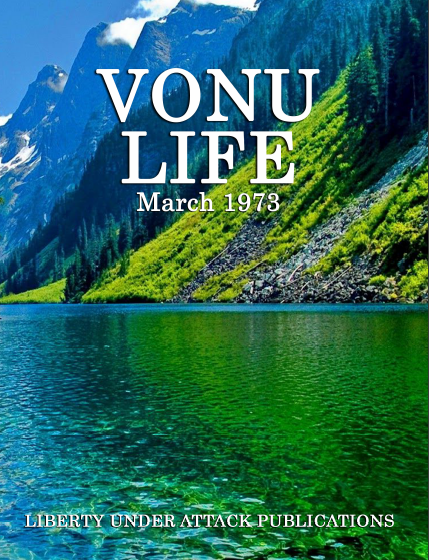Below, you will find a list of commonly asked questions about vonu. If you have any that you think need to be added, please let us know.
Q: What is vonu?
A: Vonu is the condition or quality of, as well as the action of achieving, an invulnerability to coercion. Etymologically, it is an awkward contraction of the phrase, VOluntary Not vUlnerable (hence, “vonu”).
Q: Does vonu support electoral campaigns?
A: No, because such activity is considered to be political crusading, which is the vernacular term for reformism; that is, working inside of the system in order to change it from within. Anyone who truly understands the anatomy of the State knows it is doomed to fail before you even begin.
Q: Where can I go to join the vonu movement?
A: As a matter of principle, vonu is against collective movementism, and as such, cannot be classified as a social “movement” of any kind. Cultural bowel movements are designed to fail, simply because as “critical mass” becomes closer to being achieved, the integrity of any movement’s ideological principles are diluted into nothingness. Let’s just say the winds of political expediency are bent by gurus and “leaders” who seek to exercise power over others by selling out their own followers for the sake of merging with the power establishment in order to accomplish their “new” goals; all you need to do to prove the existence of disingenuous activists is to study history.
Q: Aren’t you guys (vonuans/vonuists) just preppers & survivalists?
A: No, because although we do use many of the same methods (food & water storage, bug out bags, firearms battery, strategic relocation, etc.), our motivations and perspectives are vastly dissimilar. Unfortunately, retreaters of all kinds are usually driven by a sense of impending catastrophe, hence the emergence of “doom porn.” As self-liberators, we are more concerned about living freedom in the here and now, regardless of whether predicted doomsdays happen to occur or not.
Q: Why are vonuans unsupportive of both limited government advocates (“minarchists”) and propertarian anarchists (“ancaps”)?
A: Minarchists and ancaps believe in utopias, plain and simple. Whether it be a “constitutional” government or a stateless “society,” both place their faith in the fallacious notion of a “cultural revolution.” Again, this is repackaged collective movementism, and is hardly worth any lengthy explanation, except to say that vonu places no such faith in these things, preferring instead to get with ourselves and each other in order to build our vonuums and vonuist mini-cultures, because that’s what’s actually achievable and realistic not only within one’s lifetime, but also for the foreseeable future.
Q: I read in Vonu: The Search for Personal Freedom that Rayo had an article/chapter entitled, “Self-Seeking: Take Over a State.” In it, he explores how a third approach to creating what might be called a Permanent Autonomous Zone (PAZ) could be achievable. If anything, shouldn’t you guys be in favor of the Free State Project up in New Hampshire?
A: No, because the FSP encourages political crusading, especially at the state capitol there in Concord; although the contingent of Free Staters in Keene (“Keeniacs”) were noticeably better, they too encouraged political crusading within both the county (Cheshire) and municipal governments. Combine this alongside the scandals resulting in the unjustified ostracism of both Christopher Cantwell and Ian Bernard (aka, Ian Freeman) whenever either of them became politically inconvenient for the FSP board of trustees, a rather sinister picture begins to emerge.
That being said, Rayo wrote his article in 1967, which is about 36 years before New Hampshire was chosen by the FSP as their state government of choice. For whatever it’s worth, Rayo preferred SoCal, although he remained open to the possibility of a political migration to a small, foreign, English-speaking nation where about 1,000 libertarians could change the electoral tide. As Rayo himself said, “Function determines form, means determine ends,” and unfortunately, he seemed to have momentarily lapsed in his reasoning, for it is now obvious to us that political migration is itself a form of political crusading, since the dependency upon rulers and their elections is still present.
In brief, political migration is not the same as strategic relocation, and it is our belief that as a libertarian pioneer, Rayo was trying the articulate the latter formulation, even if he did so imperfectly at times. This is exactly why vonu, as a concept, has needed further development given all the recent advances in what could be considered to be “freedom technologies.” If anything, Rayo’s descriptions of these PAZs paralleled his own experimentation with Temporary Autonomous Zones (TAZ) in the form of vonu shelters at least 20 years before Hakim Bey coined the TAZ as a neologism.
Q: Are vonu shelters a temporary or permanent autonomous zone?
A: Depending on the type of shelter, a vonuum could be either. The mean time to harassment is a vonuan spectrum ranging from a TAZ (summer survival, all weather survival, comfortable home, and small workshop or laboratory) to a PAZ (small manufacturing, light industry, heavy industry). To be fair, what specific type of vonu shelter “counts” as a TAZ or a PAZ is debatable, but what isn’t is the fact that PAZs are an impossible pipe dream if nobody will bother using TAZs first.
Q: Is there any difference between vonuums, the Second Realm, and the agora?
A: Not much, although each term highlights different features. A vonuum is the place or situation of an invulnerability to coercion; the Second Realm is a culture of liberty that occupies its own protected space and implements independent systems of cooperation; and the agora is an open marketplace (presumably, an unlicensed, unregulated, untaxed laissez-faire freed market). Arguably, the Second Realm is the combination of the agora with vonuums, usually in the form of a TAZ; as PAZs, ethical enclaves can be made to facilitate trade while maintaining excellent security culture, whether it be in the form of an intentional community or even a freeport.
In libertarian fiction, examples of these include Aurora (from Alongside Night), Cannoneer’s Farm (from #agora), and the town of Hardyville (from Claire Wolfe’s Hardyville series).
Q: What does financial independence/retire early (FIRE) have to do with being invulnerable to coercion?
A: FIRE, also known as financially independent early retirement, is significantly important to vonumy (defined as the art of achieving an invulnerability to coercion) in that you are less susceptible to being tempted to betray your principles, such as through bribery. Entrepreneurship is the productive driver of the free market, and FIRE is a entrepreneurial strategy to escape the rat race of having a Just Over Broke (JOB). Once financial independence (FI) is achieved via the Crossover Point, where having a JOB becomes optional instead of necessary for one’s survival, then it could be said that you would be vonuer (having comparatively more invulnerability to coercion).
Q: What are some of the practical advantages of FIRE, especially in relation to vonuence (the process of achieving an invulnerability to coercion)?
A: One such advantage of FIRE is that your opportunity costs associated with a maintaining a JOB are drastically lower; in other words, the time and effort spent on commuting, redtape, and office politics is time and effort not spent on doing something truly more productive with your life.
Another advantage is making your money (capital) work for you instead you working for it (labor); put another way, instead of wage slaving your way for the next three to four decades and then “retiring” with a pension and a gold watch, you work like a dog for about a decade (at most) and then you use your accumulated capital to invest in income-producing assets, which you then pay your bills using only the investment dividends to the tune of a 4% withdrawal rate, thereby maintaining capital stocks.
Yet another advantage is the much greater ease of mobility; simply put, perpetual travelling becomes much more realistic when you aren’t tied to a location-specific workplace and you have enough savings plus multiple income streams that you can just pack up and go wherever, whenever you want (sans other considerations like dependent family and little children, of course).

